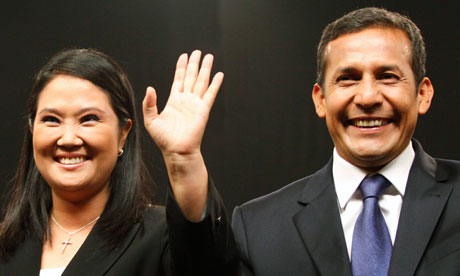Leftist 'comandante' faces former first lady in Peru's presidential election
Ollanta Humala, a nationalist linked to Hugo Chávez, and Keiko Fujimori, the daughter of a disgraced ex-leader, are frontrunners
- guardian.co.uk,
- Article history

Peruvian presidential candidates Keiko Fujimori and Ollanta Humala. Photograph: Enrique Castro-Mendivil/Reuters
He is "El Comandante", the former army officer with a whiff of Hugo Chávez about him, a champion of the disenfranchised who wants to do more for Peru's poor. She is the daughter of the disgraced former president Alberto Fujimori, a child of privilege who knows all about power and wants to use it to crack down on violent crime. Ollanta Humala, the 48-year-old nationalist and former lieutenant colonel in the army, will take on Keiko Fujimori, a rightwing congresswoman and former first lady (her father elevated her when he divorced her mother) in Peru's first round of presidential elections on Sunday. A former president and a one-time prime minister are also among the candidates. Humala is the most compelling, if opinion polls are anything to go by. In recent weeks he has leapt into first place, sending shudders through financial markets and worrying Peru's conservative power brokers. Polls predict that he will win but probably not by a big enough margin to avoid a runoff vote in June. In 2006, Humala, who was then closely linked with Chávez, Venezuela's radical leftist president, narrowly lost a second-round runoff. This time, Humala has distanced himself from the Venezuelan leader while Brazilian news reports indicate he may be taking advice from the camp of the country's popular former leader, Luiz Inácio Lula da Silva. Recast as centre-left rather than radical left, he has stressed he respects press freedom and would adhere to the market economy. But he has said he would renegotiate mining and energy contracts and rewrite Peru's constitution. Even so, he has taken to wearing suits and has swapped his red T-shirt for a white one. His rise, while not meteoric, shows that a large portion of Peruvians feel disenfranchised and shut out of the country's China-like growth. Driven by high commodity prices for its mineral resources, but also agricultural exports and manufacturing, Peru's economy has grown an average of 7% a year for the past five years, one of the world's fastest growth rates. "Peru's progress has been admirable," says Michael Shifter, president of the Inter-American Dialogue. "But it hasn't been accompanied by a fairer distribution of resources and honesty in government." A third of Peruvians still live in poverty, a fifth of children are malnourished and one in five lack access to running water. Rife corruption and weak institutions are partly to blame, while the current president, Alan García, has focused on infrastructure rather than social spending. On the campaign trail in the vast northern shantytowns on the fringe of Lima, Humala found fertile ground for his electoral promises. "This economic growth isn't reaching the poorest families. The more growth there is the more conflict it generates. We have to change this," he told the Guardian. Humala competes directly with Keiko Fujimori for the poor vote. If she were elected she would be Peru's first female president and its youngest. At 35, Fujimori has been in the public eye for most of her life. In 1994, she accepted her father's offer to become first lady aged only 19. She was elected as a congresswoman on a wave of public support and her Fuerza 2011 party enjoys the solid backing of one in five voters. Many credit her father with defeating the Maoist Shining Path guerrillas and restoring the economy and he remains highly popular for his public works in rural Peru and poor urban areas. Capitalising on his law and order legacy, she has promised to crack down on violent crime, build more jails and introduce the death penalty for certain offences. But she is a polarising figure who has failed to dispel allegations that her private university education in the United States was paid for out of public coffers. She has not ruled out pardoning her father if elected. Many suspect Fujimori, 72, is directing her campaign from his cell, where he is serving a 25-year sentence for authorising death squad killings and corruption. "If she becomes elected as president … in no time Fujimori would be freed and he would play a major if not determinant role in that government," says Gustavo Gorriti, an investigative journalist who was briefly kidnapped during Fujimori's auto-golpe, or self-coup, in which he dissolved Congress and assumed special powers on 5 April 1992. He added that Fujimori's ideal electoral scenario would be facing Humala in a runoff so she could "play with the fears of having a second Venezuela or Bolivia here in Peru". Both candidates have a strong negative vote of around 50%, according to polls. The other candidates vying for a spot in the second round are Alejandro Toledo, Peru's president from 2001 to 2006, and Pedro Pablo Kuczynski, a former investment banker who served as his finance minister and prime minister.
No comments:
Post a Comment